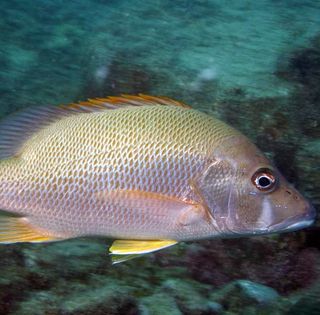Huge Newfound Coral Reef Teems With Life

The largest and most diverse reef system in the South Atlantic Ocean, the Abrolhos Bank, is twice as large as thought and teeming with life, scientists now say.
"We had some clues from local fishermen that other reefs existed, but not at the scale of what we discovered," said Rodrigo de Moura, Conservation International Brazil marine specialist and co-author of a study about the discovery. "It is very exciting and highly unusual to discover a reef structure this large and harboring such an abundance of fish."
Home to a variety of marine species such as soft corals and mollusks found only in Brazil, the Abrolhos Bank is recognized as one of the planet’s most valuable coral reefs. And the most prevalent coral in this reef, the Mussismilia coral genus, represents the only remaining plants from a coral fauna with origins in the Tertiary period, which ranges from about 2 million to 65 million years ago.
Other creatures found at the reef include the dog snapper, black grouper, and adult and juvenile masked boobies.
The researchers used a side-scan sonar to generate a 3-D map of the coral reef. Located 9 to 124 miles off the Brazilian coast, the reef's depth varied from 60 to 200 feet.
"Due to their relative inaccessibility and depth, the newly discovered reefs are teeming with life, in some places harboring 30 times the density of marine life than the known, shallower reefs," said Guilherme Dutra, Conservation International's director of marine programs in Brazil. "That's the good news. The bad news is that only a small percentage of marine habitats in the Abrolhos are protected, despite mounting localized and global threats."
Efforts are made to safeguard the reef, located off the southern coast of Brazil's Bahia state, by groups including the Marine Protected Areas in the Abrolhos. But they struggle against over-fishing, coastal development, oil drilling and ocean acidification.
Sign up for the Live Science daily newsletter now
Get the world’s most fascinating discoveries delivered straight to your inbox.
Researchers from Brazil's Federal University of Espírito Santo and Federal University of Bahia contributed to the study, which was presented Tuesday at the International Coral Reef Symposium in Fort Lauderdale, Fla.
- Image Gallery: Incredible Coral
- Image Gallery: Australia’s Great Barrier Reef
- Report: U.S. Coral Reefs In Severe Decline
